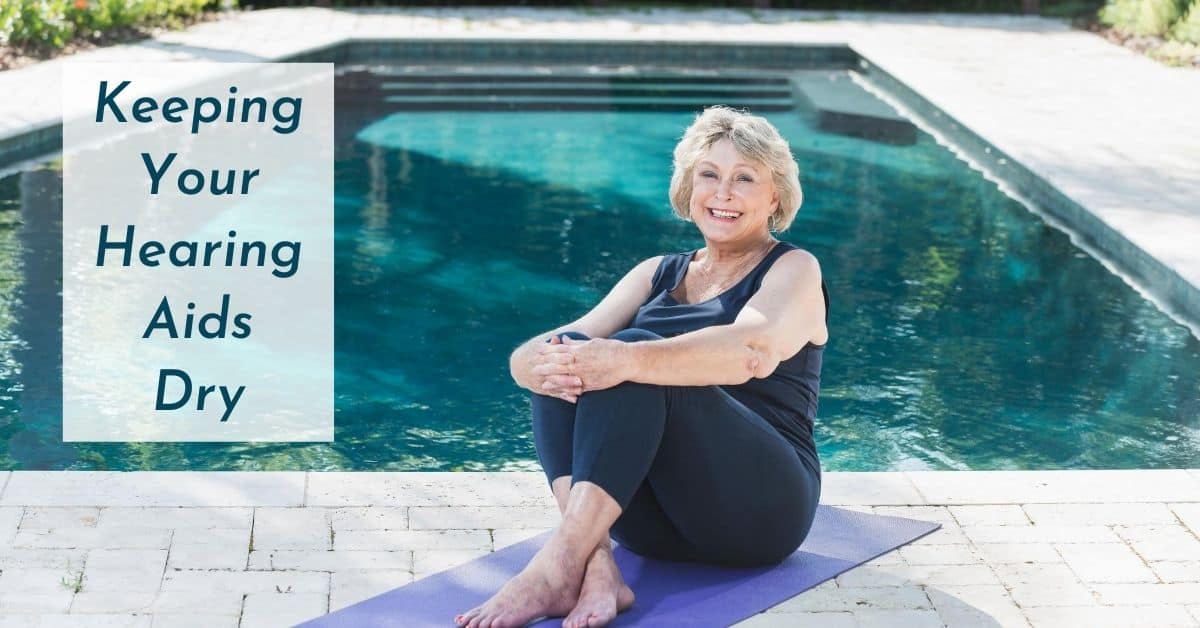- Why You Shouldn’t Do Anything With Your Earwax - April 22, 2024
- Travel Tips for People with Cochlear Implants - April 7, 2024
- How To Have A Great Conversation With People With Hearing Loss - March 22, 2024
When you think about it, hearing aids are modern technological marvels. These small devices deliver precision sound enhancement and hearing assistance through powerful microcomputers. What may be the most amazing of all is that hearing aids are built to withstand the unusual conditions of performing within a human ear canal!
The components of your hearing aid are specially developed to resist moisture, and sealed to avoid issues, but part of properly maintaining your hearing aids is preventing damage by keeping them dry. Let’s take a look at how excess moisture can damage your hearing devices and the best ways to maximize their performance.
How Moisture Damages Electronics
We all know you can’t take your phone into the swimming pool or leave a television out in the rain, but why does water and moisture cause these devices to malfunction? The moisture itself isn’t inherently the problem, but its conductive ions and liquid properties are. Ions in the water can form paths that conduct electricity so when water infiltrates an electronic system and spreads fluidly, it can cause an electrical bridge between two unconnected components. This can cause a short or even more extreme structural damage to an electronic system that can cause it to malfunction or shut down.
Depending on the metals used in an electronic system, water and other liquids can also initiate corrosion which degrades the material of components. Rusting iron and copper patina are examples of corrosion in metals and it makes components less durable and functional. In many cases errant moisture can begin the chemical changes that cause corrosion
While your hearing aids are equipped with better moisture resistance than standard electronics, they still need to be treated as devices that may be vulnerable to moisture damage. Fortunately, keeping your hearing aids dry isn’t hard to do.
The Basics
You should limit your hearing aids exposure to moisture as much as possible. Hearing aids need to be removed before showering, bathing and swimming. Don’t wear your hearing aids in heavy rainfall. Around water, store your hearing aids in a watertight container and don’t put them back in your ears until your ears have been dried.
The moisture resistance of your hearing aids helps them withstand the natural dampness of the ear canal as well as exposure to sweat. If you sweat often or heavily, however, it is best to dry your hearing aids with a clean towel immediately following a workout or other sweaty activity.
Similarly, people living in humid climates should wipe down their hearing aids often. It is important to carry a waterproof container and a clean drying cloth with you to protect your hearing aids from moisture in your daily life. From getting stuck in an unexpected rainstorm to fitting in a jog during your lunch break, being prepared to protect your hearing aids pays off.
Dehumidifying
To maximize the life and performance of your hearing aids, you will need to adopt a daily maintenance routine. When you remove your hearing aids to sleep each night, wipe them down with a clean cloth and place them in a small drying box that will wick away any moisture that may have clung to your device.
Electronic drying boxes dry your hearing aids with warm, arid airflow. For people with rechargeable hearing aids, your charging station will often conveniently double as a drying box – check with your hearing specialist to ensure this is the case.
Electronic drying boxes are an effective, low maintenance solution to moisture. Daily drying makes sure moisture cannot infiltrate and damage your hearing aids, keeping them at their best. There are also non-electronic options for hearing aid owners that may be a good match for campers, frequent travelers and anyone else who may need effective drying while away from an electrical outlet.
Non-electric dryers use substances called desiccants to pull moisture from your hearing aid. Silica packets found in certain packaging are desiccants, and desiccants for non-electronic hearing aid dryers come in a variety of forms. Found at most drug stores, desiccants may be in pellets, linings or discs. Enclosing your hearing aids overnight with a desiccant will effectively remove moisture from your devices, making them a great low-tech option.
If your hearing aids are in need of maintenance or repair, contact us today for assistance.

